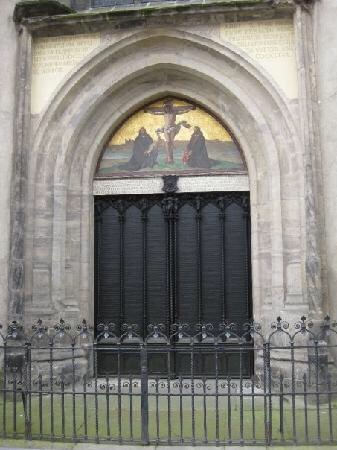
Martin Luther was one of the famous Reformers in the Protestant Reformation. He unknowingly started the Reformation on October 31, 1517.
There was a time in his life when he confessed:
“I actually hated the righteous God who punishes sinners…”
In 1505 he became a Roman Catholic monk by entering a monastery at Erfurt in Saxony Germany. In 1533 he described his life as a monk:
“I was indeed a pious monk and kept the rules of my order so strictly that I can say: “If ever a monk gained heaven through monkery, it should have been I. All my monastic brethren who knew me will testify to this. I would have martyred myself to death with fasting, praying, reading, and other good works had I remained a monk much longer.”
Luther was a very pious, moral, Roman Catholic monk trying to work his way to heaven. A heaven which is ruled by a righteous God who he confessed hating.
Why did Luther hate God? At the root of it was his ignorance. Apostle Paul writing about the unbelieving Gentiles says they are “excluded from the life of God because of the ignorance that is in” them (Ephesians 4:17-18). Such was Luther’s case. The following explains, in his own words, what happened:
“Meanwhile, that same year I had again turned to the exposition of the Psalter, confident that after the academic treatment of the Epistles of St. Paul to the Romans and Galatians and the Epistle of the Hebrews I was better trained. Certainly, I had been possessed by an unusually ardent desire to understand Paul in his Epistle to the Romans. Nevertheless, in spite of the ardour of my heart I was hindered by the unique word in the first chapter: ‘The righteousness of God is revealed in it.’ I hated that word ‘righteousness of God’, because in accordance with the usage and custom of the doctors I had been taught to understand it philosophically as meaning, as they put it, the formal or active righteousness according to which God is righteous and punishes sinners and the unjust.”
“As a monk I led an irreproachable life. Nevertheless, I felt that I was a sinner before God. My conscience was restless, and I could not depend on God being propitiated by my satisfactions [good works]. Not only did I not love, but I actually hated the righteous God who punishes sinners…. Thus a furious battle raged within my perplexed conscience, but meanwhile I was knocking at the door of this particular Pauline passage, earnestly seeking to know the mind of the great Apostle.”
“Day and night I tried to meditate upon the significance of these words: ‘The righteousness of God is revealed in it, as it is written: The righteous shall live by faith.’ Then, finally, God had mercy on me, and I began to understand that the righteousness of God is that gift of God by which a righteous man lives, namely, faith and that this sentence -The righteousness of God is revealed in the Gospel – is passive, indicating that the merciful God justifies us by faith, as it is written: ’The righteous shall live by faith.’ Now I felt as though I had been reborn altogether and had entered Paradise. In the same moment the face of the whole of scripture became apparent to me. My mind ran through the scriptures, as far as I was able to recollect them, seeking analogies in other phrases, such as the work of God, by which he makes us strong, the wisdom of God, by which he makes us wise, the strength of God, the salvation of God, the glory of God.”
“Just as intensely as I had before hated the expression ‘the righteousness of God’, I now lovingly praised this most pleasant word. This passage from Paul became to me the very gate to Paradise.”*
In another place Luther writes about this experience,
“At first whenever I read or sang the Psalm: ‘Deliver me in thy righteousness’, I was frightened, and I hated the words ‘the righteousness of God’ and ‘the work of God’, for I believed that the righteousness of God meant his severe judgment. Were he to save me accordingly, I should be damned for ever. But the words ‘the mercy of God’ and ‘the help of God’ I liked better. Thanks to God, when I understood the matter and learned that the righteousness of God means that righteousness by which he justifies us, the righteousness bestowed as a free gift in Jesus Christ, the grammar became clear and the Psalter more to my taste.”*
And in one last place he writes,
“These words ‘righteous’ and ‘righteousness of God’ struck my conscience as flashes of lightning, frightening me each time I heard them: if God is righteous, he punishes. But by the grace of God, as I once mediated upon these words in this tower and heated room: The righteous shall live by faith’ and the ‘righteousness of God’, there suddenly came into my mind the thought that if we as righteous are to live by faith, and if the righteousness of faith is to be for salvation to everyone who believes, then it is not our merit , but the mercy of God. Thus my soul was refreshed, for it is the righteous of God by which we are justified and saved through Christ. These words became more pleasant to me. Through this word the Holy Spirit enlightened me in the tower.”*
As we can read, Luther goes from a ‘God hater’ to a ‘God lover’ once he is no longer ignorant of the following verse:
‘For in it [the gospel] is the righteousness of God revealed from faith to faith; as it is written, The just shall live by faith.’ (Romans 1:17)
Martin was no longer “excluded from the life of God because of the ignorance that is in” him. By the Lord’s revelation to him, Martin went from being a lost Roman Catholic monk seeking to be saved by his good works to a person who was saved by God’s grace by faith ALONE. He says this truth ‘became to me the very gate to Paradise’. Now he could participate in the life of God with a clear conscience knowing that his sins were forgiven in Christ. He realized his good works amounted to nothing when it came to being saved from the guilt and penalty of his sin.
All of his anger and hate toward God was due to not properly understanding God’s ‘righteousness’. The Roman Catholic doctors who had taught Luther only understood one side of the ‘righteousness’ coin. In His heart Luther knew he was a sinner and he had been taught that this “righteousness” was responsible for God punishing sinners and the unjust. And he said he hated this righteous God because of this.
Unfortunately, Luther’s teachers had received an unbiblical, false work-based salvation from their Roman Catholic ancestors and could not teach Luther the other side of the “righteous” coin. This being that when sinners place their faith in the finished work of Jesus Christ on the Cross ALONE for salvation, this very righteousness is imputed or credited to their account and thereby they stand before God legally as if they had never sinned. All because of what Jesus Christ did and they are now in Him through their faith and God’s grace.
His teachers did not believe this.
The believer becomes the ‘righteousness of God’ in-Christ Jesus (II Corinthian 5:21). All of God’s moral excellence and virtue is imputed or credited to the believing sinner’s account. Hallelujah!
What about you?
Is your ignorance about God hindering your relationship with Him?
Do you have a clear conscience before Him or in your heart of hearts you know something is not right, maybe very, very wrong.
Have you ever checked God and Jesus Christ out by reading the New Testament yourself? If not, I encourage you to do so.
If your relationship with the God of the Holy Bible needs a correction or is non-existent, I pray that you will not rest until you are at peace with God the Father through Jesus Christ alone.
“The Lord … is patient toward you, not wishing for any to perish but for all to come to repentance.” (Peter – II Peter 3: 9)
Carl
* Martin Luther quotes from Hans Hillerbrand, Editor, The Reformation – A Narrative History Related by Contemporary Observers And Participants (Baker Book House, 1972) pp. 27-28


